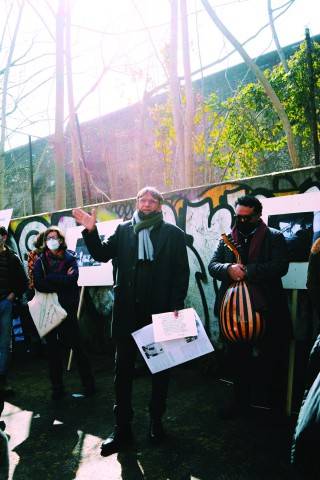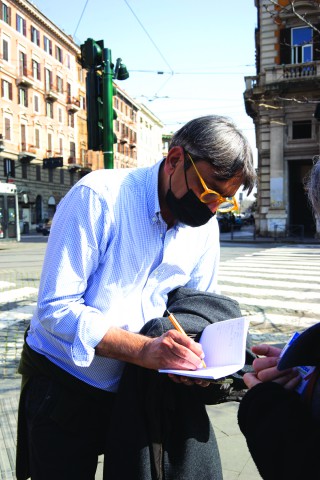
The Pakistani community in Italy numbers about 150,000, making it the second largest in Europe after the UK. Most of them come from central Punjab. A survey done by the Italian Ministry of Labor shows that the bulk of the Pakistanis in Italy are male (70 percent) and young (average age 28 years old). They mainly work in industrial units in the north of Italy; and increasingly in agriculture where they have become an essential part of the production chain doing much of the harvesting, packing and loading of produce. Relatively few run their own enterprises or small businesses.
The community comprises of mostly first-generation immigrants who are economically weak. Their educations levels are low with over two thirds having only a lower secondary education and only four percent a tertiary education. The employment rate is 37 percent - much below that of other immigrant communities. The relatively few women who are here have come over to join their spouses and tend to have a marginal role.
About half the legal resident Pakistanis only have temporary stay permits. This includes a large number of asylum seekers and unaccompanied minors. They are mainly young boys who came into the country via the overland human-traffic route through Iran, Turkey, Greece and Croatia. Once in Italy they declare themselves refugees. Most of these young men see their presence here as temporary and the aim for many of them is to move to France, Germany and the UK which offer better job prospects and higher wages.

But even those who have a “pukkah” permits tend not to put down economic or social roots calling Italy a Dayer-e-Ghair (a foreign land). They speak little Italian; mix mainly with the few Pakistanis who work with them or who come from their own village; and hardly ever socialize with Italians. Leisure pastimes are the occasional game of cricket, volleyball or Kabbadi. They rarely try to buy property and mostly live in rented accommodation, preferring to send a high proportion of their earnings home to provide for their families or building a house there.
The contrast with other immigrant communities such as the Bangladeshi or Chinese is striking. These communities rarely work for others, preferring to run their own enterprises mainly in trade and commerce. This requires them to build strong networks to meet their credit needs, develop their supply lines, file tax returns, and get the appropriate licenses and permissions from the local municipality.
Trying to organize the Pakistani community in Italy is not easy. One of those who have been working to do so is Ejaz Ahmad (EA). Ejaz got his Master’s in Mass Communications from Punjab University and worked for a while as a political journalist for Jang and Musawat. However, he was quickly disillusioned with politics in Pakistan. He came to Italy on a 10-day tourist visa in 1989 with no intention of returning.
Starting out without a job, little money and no family to back him up, Ejaz has made himself into a one of the main leaders and spokesperson for the Pakistani community in Italy. He is a qualified “cultural mediator” with a degree from the University of Rome, has published a book on Pakistan which is a reference for Italians who want to understand Pakistan’s culture and history. He currently works part time with the Ministry of Equal Opportunities. He is also an accredited journalist, represents Pakistanis in various forums, is often on TV and radio, and gives talks on immigration and integration in several schools in the Rome area. He was also once a candidate for the Mayor of Rome. We spoke to him in the Rome city center on a cold but bright winter morning.
TFT: What is the biggest issue facing Pakistanis in Italy?
EA: Lack of integration. The community lives in relative isolation from Italians and even from each other. It is mainly about their mental outlook. Most Pakistanis are first generation immigrants. Their main objective is to make ends meet and maybe send some money home. One of the few things that can bring them together is religion. If we call a meeting to discuss how to make the situation better for ourselves, to improve living conditions and interact more with Italians, very few people turn up. But if there is a meeting to discuss the building or refurbishing of a mosque, Pakistanis will happily contribute time and money.
Another issue is the lack of cohesiveness in the Pakistani community. It is virtually impossible to create any organization without it degenerating into an argument about who will be president, treasurer, etc.

TFT: Why is that?
EA: The key factor is fear – integration means redefining yourself and this means giving up your old identity. One of my mentors told me that the process on immigration starts when the body moves and is over only when the soul moves; when one integrates and understands the culture of the hosting country. The first generation of immigrants has only moved their bodies but is scared of moving their soul.
TFT: What was the most important event of your life here?
EA: There were several but the first was the chance to work with one of the big trade unions where I would help Pakistanis and other immigrants sort out their paper; coach them for work interviews; and help sort out disputes related to salaries and allowance. Through this experience I learnt the joy of social work – of helping others. The other big event in my life was meeting my wife. She was a student at the university when we first met and she, as well her family, have always helped and supported me. I owe so much to her.
TFT: What was a difficult moment?
EA: There are so many. When I was alone, working long hours in McDonalds or the Metro Store in Bologna. But I was lucky to find people to help me and guide me. The following couplet by Faiz Ahmed Faiz encapsulates my feelings:
Raat youn dil mein teri, khoi hui yaad ayi,
Jaise veeranay mein, chupke se, bahar ajaye,
Jaise sehraon mein holay se chali, baad-e-naseem
Jaise beemar ko, bewaja, qarar ajaye
Now that I am more settled, my main pain is from not being able to do more. Recently a young couple (both without full legal status) had a baby girl which they had to put up for adoption as they could not afford to look after her. It was heartbreaking to see the parents sign off on the legal documents which included a clause requiring them not to have any contact with the child until she was 18 years old. None of us could keep back our tears.

TFT: What about the younger generations?
EA: Aspiration levels are low. We do not have role models like Sadiq Khan or Shahid Javed, high fliers working in the top levels of Government of UK, who are children of Pakistani immigrants. What does not help is the relative isolation in which their parents live and try to impose on their children, especially girls. This means that the second generation lacks a sense of belonging to Italian society.
Many young people dream of moving to the UK – both because learning English would make them more internationally mobile, and also because of the perception that there are more opportunities there. While this was a realistic goal before Brexit, it will be increasingly difficult especially for low skill workers.
Returning to Pakistan for children born in Italy is rarely an option. The physical and social conditions of the places of origin are completely alien to them. Often, they only speak the dialect of their village and are rarely fluent in English or Urdu.
I am much concerned that unless there are greater efforts to integrate, the second generation will find life very difficult.
TFT: Is the community well perceived by Italians?
EA: Ours is a generally law-abiding community and are rarely involved with the police. The few Pakistanis in jail are there for arguments between families and groupings that degenerated into fights and violence. A few have been arrested for unofficial money transfers through the Hundi.
However, we need to recall that Islamophobia is a worldwide phenomenon and this creates an intrinsic prejudice against us. There have been several high-profile cases involving Pakistanis that make made it to the national press and give us a bad name. For example, the case of the young girl who was taken to Pakistan for a holiday and then forcibly married to someone from her parents’ village. A strong campaign by her friends in Italy forced the Italian Embassy in Islamabad to intervene on her behalf and facilitate her return to Italy. Other cases such as that of Asma Bibi or reports of terror attacks strengthen the perception that Pakistanis are a generally retrograde and fundamentalist group.
TFT: What is the role of the embassy in helping the Pakistani community?
EA: The main role of the embassy is to provide consular services – passports, ID cards, deportations, etc. Before the COVID crisis they used to organize social events on special occasions such as Eid, or when a prime minister or other top dignitaries visited Italy. However, apart from some notable exceptions, the embassy staff in Italy has made little effort to engage with the community and understand its fears and apprehensions. Partly this is also because they do not speak Italian – nor are they provided any special training before their posting; and partly because their tenure here is only for three years, barely enough time to understand the issues, let alone build trust and confidence.
TFT: If the prime minister of Pakistan were to read this interview, what would you ask him to do for the Pakistani community in Italy?
EA: There is a lot he and the government could do. Their main focus should be to help the immigrant community integrate in Italy and to promote the image of Pakistan. Concrete steps could include much stronger involvement of the embassy staff in the day-to-day problems of the community such as work contracts, opening of bank accounts and counselling especially with regards to dealing with second generation who is born here and grow up with a very different outlook from their parents. To do this there is an urgent need to create a group or committee, comprising local leaders, academics from Pakistan or with interest in Pakistan, and embassy staff. In choosing local leaders, it is essential that we do not end up with the usual “Chaudhries” who are not trusted by most Pakistanis.
In order to promote Pakistani culture, the government should help build an institute or a library or fund research in some of those universities with strong interest in oriental studies.
The writers are Pakistanis who work and live in Rome. This is the first in a series of articles on Pakistanis in Italy
The community comprises of mostly first-generation immigrants who are economically weak. Their educations levels are low with over two thirds having only a lower secondary education and only four percent a tertiary education. The employment rate is 37 percent - much below that of other immigrant communities. The relatively few women who are here have come over to join their spouses and tend to have a marginal role.
About half the legal resident Pakistanis only have temporary stay permits. This includes a large number of asylum seekers and unaccompanied minors. They are mainly young boys who came into the country via the overland human-traffic route through Iran, Turkey, Greece and Croatia. Once in Italy they declare themselves refugees. Most of these young men see their presence here as temporary and the aim for many of them is to move to France, Germany and the UK which offer better job prospects and higher wages.

But even those who have a “pukkah” permits tend not to put down economic or social roots calling Italy a Dayer-e-Ghair (a foreign land). They speak little Italian; mix mainly with the few Pakistanis who work with them or who come from their own village; and hardly ever socialize with Italians. Leisure pastimes are the occasional game of cricket, volleyball or Kabbadi. They rarely try to buy property and mostly live in rented accommodation, preferring to send a high proportion of their earnings home to provide for their families or building a house there.
The contrast with other immigrant communities such as the Bangladeshi or Chinese is striking. These communities rarely work for others, preferring to run their own enterprises mainly in trade and commerce. This requires them to build strong networks to meet their credit needs, develop their supply lines, file tax returns, and get the appropriate licenses and permissions from the local municipality.
Trying to organize the Pakistani community in Italy is not easy. One of those who have been working to do so is Ejaz Ahmad (EA). Ejaz got his Master’s in Mass Communications from Punjab University and worked for a while as a political journalist for Jang and Musawat. However, he was quickly disillusioned with politics in Pakistan. He came to Italy on a 10-day tourist visa in 1989 with no intention of returning.
Starting out without a job, little money and no family to back him up, Ejaz has made himself into a one of the main leaders and spokesperson for the Pakistani community in Italy. He is a qualified “cultural mediator” with a degree from the University of Rome, has published a book on Pakistan which is a reference for Italians who want to understand Pakistan’s culture and history. He currently works part time with the Ministry of Equal Opportunities. He is also an accredited journalist, represents Pakistanis in various forums, is often on TV and radio, and gives talks on immigration and integration in several schools in the Rome area. He was also once a candidate for the Mayor of Rome. We spoke to him in the Rome city center on a cold but bright winter morning.
Returning to Pakistan for children born in Italy is rarely an option. The physical and social conditions of the places of origin are completely alien to them
TFT: What is the biggest issue facing Pakistanis in Italy?
EA: Lack of integration. The community lives in relative isolation from Italians and even from each other. It is mainly about their mental outlook. Most Pakistanis are first generation immigrants. Their main objective is to make ends meet and maybe send some money home. One of the few things that can bring them together is religion. If we call a meeting to discuss how to make the situation better for ourselves, to improve living conditions and interact more with Italians, very few people turn up. But if there is a meeting to discuss the building or refurbishing of a mosque, Pakistanis will happily contribute time and money.
Another issue is the lack of cohesiveness in the Pakistani community. It is virtually impossible to create any organization without it degenerating into an argument about who will be president, treasurer, etc.

TFT: Why is that?
EA: The key factor is fear – integration means redefining yourself and this means giving up your old identity. One of my mentors told me that the process on immigration starts when the body moves and is over only when the soul moves; when one integrates and understands the culture of the hosting country. The first generation of immigrants has only moved their bodies but is scared of moving their soul.
TFT: What was the most important event of your life here?
EA: There were several but the first was the chance to work with one of the big trade unions where I would help Pakistanis and other immigrants sort out their paper; coach them for work interviews; and help sort out disputes related to salaries and allowance. Through this experience I learnt the joy of social work – of helping others. The other big event in my life was meeting my wife. She was a student at the university when we first met and she, as well her family, have always helped and supported me. I owe so much to her.
TFT: What was a difficult moment?
EA: There are so many. When I was alone, working long hours in McDonalds or the Metro Store in Bologna. But I was lucky to find people to help me and guide me. The following couplet by Faiz Ahmed Faiz encapsulates my feelings:
Raat youn dil mein teri, khoi hui yaad ayi,
Jaise veeranay mein, chupke se, bahar ajaye,
Jaise sehraon mein holay se chali, baad-e-naseem
Jaise beemar ko, bewaja, qarar ajaye
Now that I am more settled, my main pain is from not being able to do more. Recently a young couple (both without full legal status) had a baby girl which they had to put up for adoption as they could not afford to look after her. It was heartbreaking to see the parents sign off on the legal documents which included a clause requiring them not to have any contact with the child until she was 18 years old. None of us could keep back our tears.

TFT: What about the younger generations?
EA: Aspiration levels are low. We do not have role models like Sadiq Khan or Shahid Javed, high fliers working in the top levels of Government of UK, who are children of Pakistani immigrants. What does not help is the relative isolation in which their parents live and try to impose on their children, especially girls. This means that the second generation lacks a sense of belonging to Italian society.
Many young people dream of moving to the UK – both because learning English would make them more internationally mobile, and also because of the perception that there are more opportunities there. While this was a realistic goal before Brexit, it will be increasingly difficult especially for low skill workers.
Returning to Pakistan for children born in Italy is rarely an option. The physical and social conditions of the places of origin are completely alien to them. Often, they only speak the dialect of their village and are rarely fluent in English or Urdu.
I am much concerned that unless there are greater efforts to integrate, the second generation will find life very difficult.
TFT: Is the community well perceived by Italians?
EA: Ours is a generally law-abiding community and are rarely involved with the police. The few Pakistanis in jail are there for arguments between families and groupings that degenerated into fights and violence. A few have been arrested for unofficial money transfers through the Hundi.
However, we need to recall that Islamophobia is a worldwide phenomenon and this creates an intrinsic prejudice against us. There have been several high-profile cases involving Pakistanis that make made it to the national press and give us a bad name. For example, the case of the young girl who was taken to Pakistan for a holiday and then forcibly married to someone from her parents’ village. A strong campaign by her friends in Italy forced the Italian Embassy in Islamabad to intervene on her behalf and facilitate her return to Italy. Other cases such as that of Asma Bibi or reports of terror attacks strengthen the perception that Pakistanis are a generally retrograde and fundamentalist group.
TFT: What is the role of the embassy in helping the Pakistani community?
EA: The main role of the embassy is to provide consular services – passports, ID cards, deportations, etc. Before the COVID crisis they used to organize social events on special occasions such as Eid, or when a prime minister or other top dignitaries visited Italy. However, apart from some notable exceptions, the embassy staff in Italy has made little effort to engage with the community and understand its fears and apprehensions. Partly this is also because they do not speak Italian – nor are they provided any special training before their posting; and partly because their tenure here is only for three years, barely enough time to understand the issues, let alone build trust and confidence.
TFT: If the prime minister of Pakistan were to read this interview, what would you ask him to do for the Pakistani community in Italy?
EA: There is a lot he and the government could do. Their main focus should be to help the immigrant community integrate in Italy and to promote the image of Pakistan. Concrete steps could include much stronger involvement of the embassy staff in the day-to-day problems of the community such as work contracts, opening of bank accounts and counselling especially with regards to dealing with second generation who is born here and grow up with a very different outlook from their parents. To do this there is an urgent need to create a group or committee, comprising local leaders, academics from Pakistan or with interest in Pakistan, and embassy staff. In choosing local leaders, it is essential that we do not end up with the usual “Chaudhries” who are not trusted by most Pakistanis.
In order to promote Pakistani culture, the government should help build an institute or a library or fund research in some of those universities with strong interest in oriental studies.
The writers are Pakistanis who work and live in Rome. This is the first in a series of articles on Pakistanis in Italy

